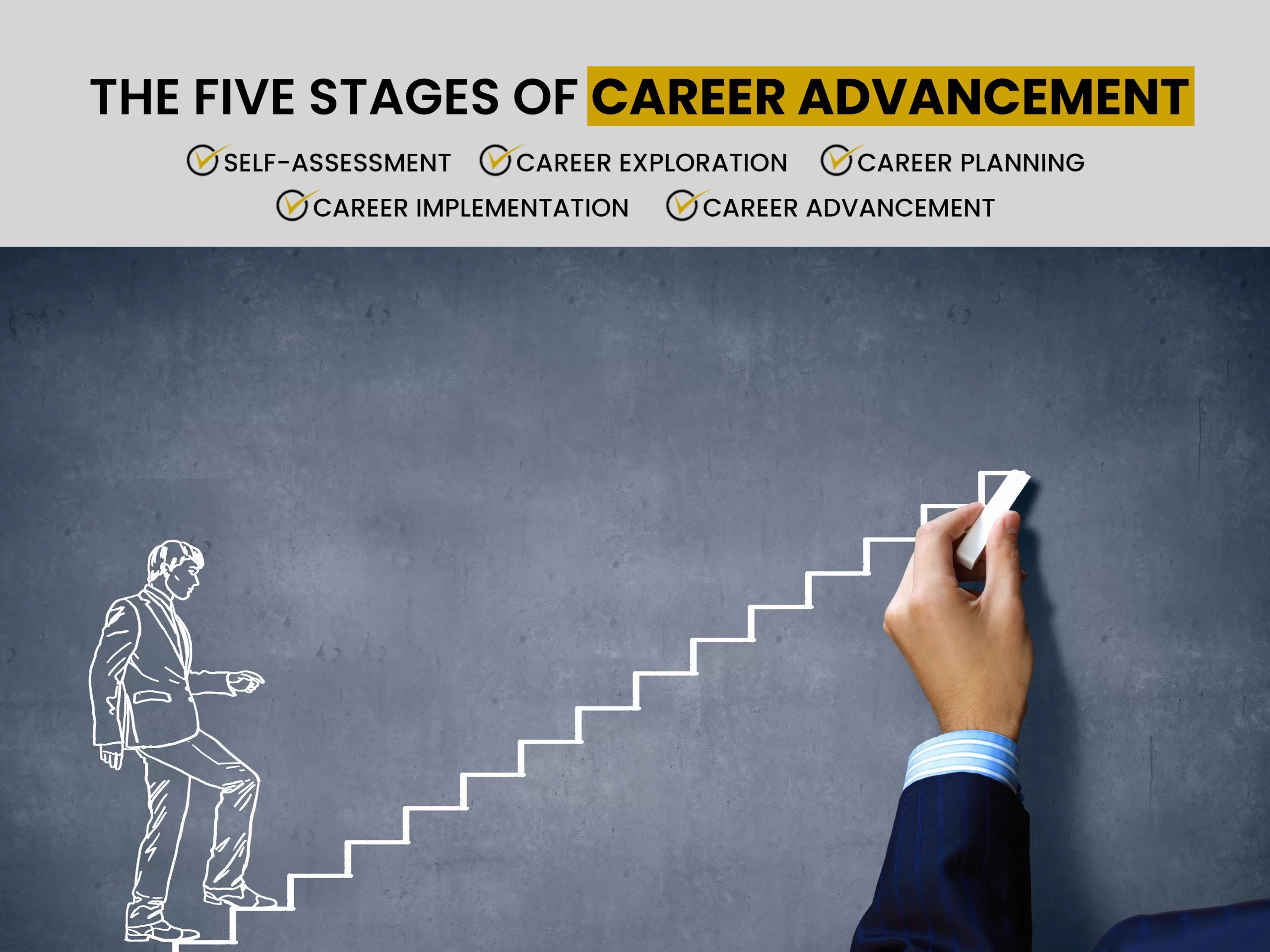Career development may be a deep-rooted journey that is basic to accomplishing proficient fulfilment and victory. Whether you’re just beginning your career or looking to form a critical alternative, understanding career development stages UK, can help you explore your way more successfully. This guide will explore the five stages of career development, giving significant tips for each organisation to assist you in progressing your career within the UK.
Key Takeaways
- Understanding and navigating the five stages—Self-Assessment, Career Exploration, Career Planning, Career Implementation, and Career Advancement—are crucial for career success and satisfaction.
- Reflecting on your interests, values, skills, and personality traits helps identify suitable career paths.
- Engaging in informational interviews, attending career fairs, and shadowing professionals can provide valuable insights into different careers.
- Setting SMART goals and developing a career development plan with actionable steps is essential for achieving career objectives.
- Actively applying for jobs, preparing for interviews, and building a professional brand is crucial to realising career goals.
Significance of Career Development
Career advancement is pivotal for several reasons. It affects people’s goals, accomplishes proficient objectives, increases work fulfilment, and improves employability. In addition, a well-thought-out career arrangement can lead to better work execution, higher profit, and more opportunities for advancement. For bosses, supporting employee career development leads to a more persuaded and talented workforce, diminishing turnover and cultivating dependability.
The Five Stages of Career Advancement
Self-Assessment
Career Exploration
Career Planning
Career Implementation
Career Advancement

Stage 1: Self-Assessment
Self-assessment is the foundational arrangement of career advancement. It includes assessing your interface, values, aptitudes, and identity traits to determine what careers fit you well.
Noteworthy Tips for Self-Assessment:
Reflect on Your Interface and Values: List exercises and themes you’re almost enthusiastic about. Consider what values are critical to you in work, such as work-life adjustment, work security, or making a difference in others.
Distinguish Your Abilities: Take stock of your complex and delicate aptitudes. Difficult abilities are specialised capacities like capability in the program, whereas delicate aptitudes incorporate communication, authority, and problem-solving capacities.
Utilise Appraisal Apparatuses: Use career appraisal devices such as the Myers-Briggs Sort Marker (MBTI), Strong Interest Inventory, or the Holland Code (RIASEC) to gain insights into your identity and career inclinations.
Look for Input: Ask companions, family, and colleagues for their viewpoints on your qualities and areas for improvement.
Stage 2: Career Exploration
Once you understand yourself more clearly, the other step is investigating different career alternatives. This includes inquiring about diverse areas and businesses and considering how they adjust to your self-assessment.
Significant Tips for Career Exploration:
Conduct Enlightening Interviews: Reach out to experts in areas of interest to memorise almost all of their encounters and accumulate exhortation. This could give a practical see of what different jobs involve.
Go to Career Fairs and Organising Occasions: These occasions offer openings to meet bosses and industry experts, gain insights into different careers, and make essential associations.
Investigate Online: Utilise online assets such as worksheets, company websites, and industry distributions to memorise approximately careers, work prerequisites, and patterns.
Shadow Experts: Organise to shadow experts in your interest and urge a firsthand look at their everyday lives and work environment.
Stage 3: Career Planning
Career planning includes setting short-term and long-term career objectives and creating techniques. This arrangement is pivotal for making a guide for your career advancement.
Significant Tips for Career Planning:
Set Shrewd Objectives: Guarantee your objectives are Particular, Quantifiable, Achievable, Pertinent, and Time-bound. For illustration, securing a promotion within two to six months or a total of a necessary certification is essential.
Make a Career Advancement Arrange: Lay out the steps you need to take to attain your objectives. These include extra instruction, securing modern abilities, or building a professional network.
Look for Mentorship: Discover a mentor who can provide direction, bolster, and experiences based on their career encounters. A guide can assist you in exploring challenges and making educated choices.
Remain Adaptable: Be prepared to alter your plans as necessary. Career paths are only sometimes straight, and being versatile can help you take advantage of unforeseen openings.
Stage 4: Career Implementation
Career implementation is almost taking action to realise your career objectives. This organisation includes job searching, applying for positions, and building your proficient brand.
Significant Tips for Career Implementation:
Clean Your CV and Cover Letter: Ensure your CV and cover letter are up-to-date, custom-fitted to each work application, and highlight your significant aptitudes and accomplishments.
Get ready for Interviews: Hone common interview questions, inquire about the company and create your STAR (Situation, Task, Action, Result) strategy for replying to behavioural questions.
Use LinkedIn to learn about your proficiency, interface with industry experts, and apply for employment. Ensure your profile is complete and proficient.
Proceed Learning: Remain up-to-date with industry patterns and advancements by attending workshops and webinars and seeking pertinent courses or certifications.
Stage 5: Career Advancement
Career advancement centres on developing and advancing within your chosen field. This arrangement includes looking for advancements, taking on modern challenges, and ceaselessly developing your abilities and knowledge.
Noteworthy Tips for Career Advancement:
Look for Input and Act on It: Frequently seek input from bosses and colleagues, utilising it to progress your execution and create unused abilities.
Take on Unused Obligations: Volunteer for challenging projects or leadership parts that can assist you in constructing unused abilities and illustrating your capabilities.
Stage Deliberately: Build and maintain proficient connections inside and outside your organisation. Organising can open entryways to modern openings and give important back.
Contribute to Proficient Advancement: Seek after progressing degrees, certifications, or preparing programs to upgrade your capabilities and make you more competitive.
Career Development Tips With Power of Me
The Power of Me emphasises the importance of career development. It’s about recognising your potential, making informed decisions, and actively shaping your professional journey. By embracing the power of self-reflection, strategic planning, and continuous learning, you can transform your career aspirations into reality. This empowerment leads to greater job satisfaction, increased opportunities, and the ability to navigate the dynamic landscape of your career with confidence and resilience.
FAQs For Career Development
What is career development?
Career development is a lifelong process of managing learning, work, leisure, and transitions to move towards a personally determined and evolving preferred future.
Why is self-assessment important in career development?
Self-assessment helps you understand your interests, values, skills, and personality traits, which is essential for identifying career paths that align with your strengths and preferences.
How can I explore different career options effectively?
You can explore career options by conducting informational interviews, attending career fairs, researching online, and shadowing professionals in fields of interest.
What are SMART goals in career planning?
SMART goals are Specific, Measurable, Achievable, Relevant, and Time-bound objectives that provide clear direction and milestones in your career development plan.
How can I improve my chances of career advancement?
To improve your chances of career advancement, seek feedback and act on it, take on new responsibilities, network strategically, and invest in professional development through courses and certifications.
Conclusion
Understanding and navigating the career development stages UK, including self-assessment, career exploration, career planning, career execution, and career advancement, can improve your career direction. By taking a proactive and critical approach to your career, you’ll accomplish more proficient satisfaction, success, and fulfilment.
Career advancement is an energetic preparation that requires progressing exertion and adjustment. Whether at the start of your career or looking to make an altar, the tips given in this direct can assist you in taking essential steps toward your career objectives. Grasp the travel, remain open to modern openings, and persistently contribute to your development and improvement. Your future self will thank you.


